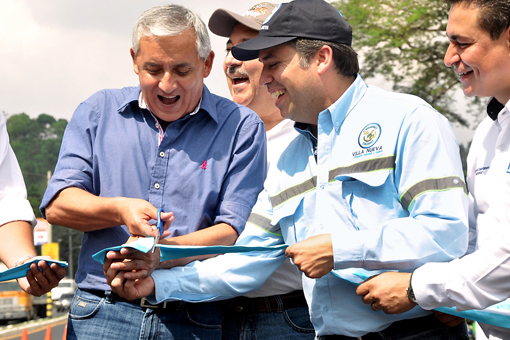Edwin Escobar dreams of turning Villa Nueva—Guatemala’s second most populous city—into the “next Bogotá.” The vision of the new mayor of this colonial-era city, just 10 miles (16 kilometers) south of the capital, might seem like conventional political rhetoric. But Escobar, who took office just last year, is not a conventional politician. A self-described “serial entrepreneur,” he was on the fast track to a profitable business and academic career when he became fascinated by the possibilities of political action.
The son of a U.S. Peace Corps volunteer and a father jailed for 15 months during Guatemala’s civil war, Escobar, 43, was the youngest-ever graduate of the MBA program at Northwestern University’s Kellogg School of Management. There he received the Dean’s Service Award, and was in the inaugural fellowship class of the elite Central America Leadership Initiative—part of The Aspen Institute’s Global Leadership Network. But it was as dean of the engineering program at Universidad Rafael Landívar, his undergraduate alma mater, that Escobar experienced a “profound change of heart” that drew him to politics.
After advising Alejandro Giammettei, the third-place candidate in Guatemala’s 2007 presidential election, Escobar embarked on a 40-day tour across the country to map out his professional options. A villanovano by birth and a descendant of the city’s founders, he began traveling through Villa Nueva’s 526 communities to meet with as many of the city’s 1 million-plus residents as possible. In 2010, he helped found the Asociación por Una Mejor Guatemala (Association for a Better Guatemala), a nonprofit organization that promotes volunteerism and implements community development projects. Through the association, Escobar funded the production of a geotracking crime detection tool known as Seguridad para Nuestra Comunidad (Security for Our Community—SPNC) with the aim of reducing Villa Nueva’s high homicide rate (36 per 100,000 persons in 2011).
Escobar ran for mayor of Villa Nueva in 2011 because he preferred “an active, technical and executive role” over a legislative one. He won handily in a crowded field, with twice the number of votes of the second-place finisher. Since taking office in January 2012, Escobar’s main goal has been increasing citizen empowerment and confidence through increased anti-crime measures—and eventually boosting investment in the city.
His policies seem to be working. SPNC helped reduce crime by 32 percent in the first nine months of 2012. Escobar is also staffing an anti-crime center with 450 security forces and financing the lighting and beautification of Villa Nueva’s public spaces, which he believes will drive the crime rate down further. But he has to be creative: due to Guatemala’s poor tax collection rate—slightly above 10 percent of GDP in 2011—Escobar has a slim $30 million budget to work with. With assistance from the Inter-American Development Bank and the World Bank, Escobar organized a handful of symposia last year to attract financiers to invest in Villa Nueva’s potential.
Escobar is realistic about the limitations of politics. He faces a gridlocked city council that often challenges his initiatives. “I’m fighting the status quo and have to reinvent myself every day,” he admits. But his tenure as mayor has clearly whetted his appetite for politics. Although there are no term limits preventing him from running again when his mayoral term expires in 2016, Escobar is still weighing his political future. Will he return to business or the academic world? He won’t say. But few observers believe that a larger national platform is out of the question.




